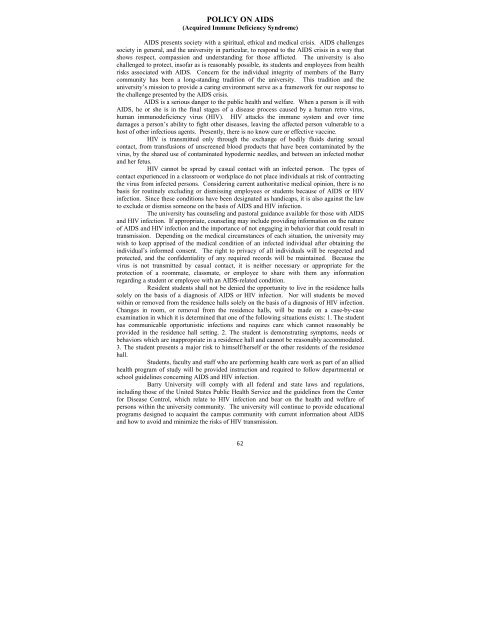Dr. Lin's Instructional Web - Barry University
Dr. Lin's Instructional Web - Barry University
Dr. Lin's Instructional Web - Barry University
You also want an ePaper? Increase the reach of your titles
YUMPU automatically turns print PDFs into web optimized ePapers that Google loves.
POLICY ON AIDS<br />
(Acquired Immune Deficiency Syndrome)<br />
AIDS presents society with a spiritual, ethical and medical crisis. AIDS challenges<br />
society in general, and the university in particular, to respond to the AIDS crisis in a way that<br />
shows respect, compassion and understanding for those afflicted. The university is also<br />
challenged to protect, insofar as is reasonably possible, its students and employees from health<br />
risks associated with AIDS. Concern for the individual integrity of members of the <strong>Barry</strong><br />
community has been a long-standing tradition of the university. This tradition and the<br />
university’s mission to provide a caring environment serve as a framework for our response to<br />
the challenge presented by the AIDS crisis.<br />
AIDS is a serious danger to the public health and welfare. When a person is ill with<br />
AIDS, he or she is in the final stages of a disease process caused by a human retro virus,<br />
human immunodeficiency virus (HIV). HIV attacks the immune system and over time<br />
damages a person’s ability to fight other diseases, leaving the affected person vulnerable to a<br />
host of other infectious agents. Presently, there is no know cure or effective vaccine.<br />
HIV is transmitted only through the exchange of bodily fluids during sexual<br />
contact, from transfusions of unscreened blood products that have been contaminated by the<br />
virus, by the shared use of contaminated hypodermic needles, and between an infected mother<br />
and her fetus.<br />
HIV cannot be spread by casual contact with an infected person. The types of<br />
contact experienced in a classroom or workplace do not place individuals at risk of contracting<br />
the virus from infected persons. Considering current authoritative medical opinion, there is no<br />
basis for routinely excluding or dismissing employees or students because of AIDS or HIV<br />
infection. Since these conditions have been designated as handicaps, it is also against the law<br />
to exclude or dismiss someone on the basis of AIDS and HIV infection.<br />
The university has counseling and pastoral guidance available for those with AIDS<br />
and HIV infection. If appropriate, counseling may include providing information on the nature<br />
of AIDS and HIV infection and the importance of not engaging in behavior that could result in<br />
transmission. Depending on the medical circumstances of each situation, the university may<br />
wish to keep apprised of the medical condition of an infected individual after obtaining the<br />
individual’s informed consent. The right to privacy of all individuals will be respected and<br />
protected, and the confidentiality of any required records will be maintained. Because the<br />
virus is not transmitted by casual contact, it is neither necessary or appropriate for the<br />
protection of a roommate, classmate, or employee to share with them any information<br />
regarding a student or employee with an AIDS-related condition.<br />
Resident students shall not be denied the opportunity to live in the residence halls<br />
solely on the basis of a diagnosis of AIDS or HIV infection. Nor will students be moved<br />
within or removed from the residence halls solely on the basis of a diagnosis of HIV infection.<br />
Changes in room, or removal from the residence halls, will be made on a case-by-case<br />
examination in which it is determined that one of the following situations exists: 1. The student<br />
has communicable opportunistic infections and requires care which cannot reasonably be<br />
provided in the residence hall setting. 2. The student is demonstrating symptoms, needs or<br />
behaviors which are inappropriate in a residence hall and cannot be reasonably accommodated.<br />
3. The student presents a major risk to himself/herself or the other residents of the residence<br />
hall.<br />
Students, faculty and staff who are performing health care work as part of an allied<br />
health program of study will be provided instruction and required to follow departmental or<br />
school guidelines concerning AIDS and HIV infection.<br />
<strong>Barry</strong> <strong>University</strong> will comply with all federal and state laws and regulations,<br />
including those of the United States Public Health Service and the guidelines from the Center<br />
for Disease Control, which relate to HIV infection and bear on the health and welfare of<br />
persons within the university community. The university will continue to provide educational<br />
programs designed to acquaint the campus community with current information about AIDS<br />
and how to avoid and minimize the risks of HIV transmission.<br />
62



